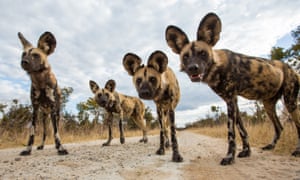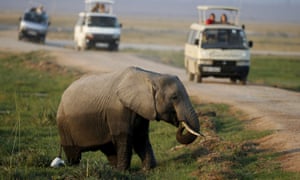“Deforestation Wipes Out an Area the Size of Belgium”

The world’s old-growth rainforests are shrinking at an alarming rate, with enough trees lost last year to cover all of Belgium or two Connecticuts, a new report shows.
Tropical rainforests are found mainly in Equatorial countries, but they store vast amounts of carbon dioxide, so keeping them intact is crucial to fighting global climate change. In addition, they are home to a broad range of species, including orangutans, mountain gorillas and tigers.You’v
“Africa’s most famous trees are dying, and scientists suspect a changing climate”

The research, by Adrian Patrut of Babes-Bolyai University in Romania and an international group of colleagues, finds that in the past 12 years, “9 of the 13 oldest and 5 of the 6 largest individuals have died, or at least their oldest parts/stems have collapsed and died.”
“Hot dogs: rising heat makes it too hot for Africa’s wild dogs to hunt”

Rising temperatures are making it too hot for African wild dogs to hunt and the number of their pups that survive is plummeting, according to a new study. The research is among the first to show a direct impact of increased heat on wildlife that appears well adapted to high temperatures.
“Does climate change cause conflict?”

https://www.brookings.edu/blog/africa-in-focus/2017/01/20/does-climate-change-cause-conflict/
A research paper, “Warming increases the risk of civil war in Africa,” presented to the U.S. National Academy of Sciences claims that temperature rises in Africa have coincided with significant increases in the likelihood of war.
“Elephant poaching costing African nations millions in lost tourism revenue”

Researchers looked at visitor and elephant data across 25 countries, and modelled financial losses from fewer visitors in protected areas due to the illegal wildlife trade, which has caused elephant numbers to plummet by more than 100,000 in the last decade. They concluded that Africa was most likely losing $25m in tourism revenue a year.
“World’s Most Expensive African Buffalo Valued at $11.1 Million”

Africa’s biggest-horned and disease-free buffalo was valued at a record amount on Saturday after South Africa-based businessman Peter Bellingham bought a 25 percent share for 44 million rand ($2.8 million).
“South Africa Rhino Poaching Surges at Least 42% From 2012”
Rhinoceros poaching in South Africa has surged at least 42 percent this year with nearly a 20th of the local herd killed as the demand for their horns, which is falsely believed to cure cancer and boost sexual prowess, continued to rise.
“Solar Boom Boosts South African Salaries With 25% Jobless “
“Clean-energy developers are being lured by government incentives and about 360 days of sunshine a year.”
What’s really causing the boom, government incentives or the sunshine?



Recent Comments